- Home
- Robert B. Parker
Small Vices s-24
Small Vices s-24 Read online
Small Vices
( Spenser - 24 )
Robert B Parker
Robert B Parker
Small Vices
For Joan: You may have been a headache, but you've never been a bore.
Through tattered clothes small vices do appear;
Robes and furred gowns hide all. Plate sin with gold,
And the strong lance of justice hurtless breaks;
Arm it in rags, a pygmy's straw does pierce it.
–KING LEAR
Chapter 1
THE LAST TIME I saw Rita Fiore she'd been an assistant DA with red hair, first-rate hips, and more attitude than an armadillo. She'd had a drink with me in the downstairs bar at the Parker House, complained about men, and introduced me to a blowhard from the DEA named Fallon, who answered more questions about the cocaine trade than I'd asked. This time we were alone, in a conference room on the thirty-ninth floor of the former Mercantile Building, with a view of the coastline that extended north to Greenland and south to Tierra del Fuego. She still had red hair. She still had the hips. And she was still tougher than Pat Buchanan. But she wasn't a prosecutor anymore. She was the senior litigator for Cone, Oakes and Baldwin, and a member of the firm.
"Coffee?" she said.
"Sure."
I had decided that I was more alert with coffee than without it. So I decided to have a couple of cups each day, to keep my heart rate up. This one would be my third, but my heart was still a little sluggish. Rita sent a female underling for the coffee, and leaned a little back in her chair and crossed her legs. Her skirt was a little short for business, just as her hair was a little long. I knew Rita knew that, and I knew she didn't care.
"Still got the wheels," I said.
"Yeah, and I'm still spinning them."
"Beats the view out of Dedham District Court," I said.
"Oh, yeah. Professionally I'm a big goddamned success. But am I married?"
"Gee," I said. "I wish I could help."
"You had your chance."
I grinned.
"Reminds me of an old joke," I said.
"I know the joke," Rita said. "And never mind."
The female underling came back with two coffees in real cups, with a cream pitcher and sugar bowl on a silver tray. Everything bore the firm's initials.
"Discourages the clients from stealing stuff," Rita said.
I put some sugar in, and some cream, and had a sip. It was lukewarm.
"I thought you got married," I said.
"I did. Twice. Both jerks."
"Probably ought to stop doing that," I said.
"Marrying jerks? Yeah, I should. But you eliminate the jerks, and who you going to marry?"
"A woman needs a man like a fish needs a bicycle," I said.
"How come that's the only feminist remark guys can quote?"
"There's another one," I said, "something about whore to her husband, slave to her children? Have I got it right?"
Rita grinned at me. "Could you maybe just shut the fuck up?" she said.
"Sure."
Rita drank some of her coffee and made a face.
"Limoges china on a silver tray and they can't get the coffee hot," she said.
I looked out the window. The ocean was gray today, and the far sky was the same color, so that the horizon was hard to distinguish and the distance just seemed to fade away. I could see the wake of a nearly indistinguishable power boat as it pushed past one of the channel markers in the outer harbor.
"About a year and a half ago, when I was still prosecuting, we had a guy named Ellis Alves. Charged with the murder of a Pemberton College student named Melissa Henderson."
"I remember," I said. "You got a conviction."
"Yeah, what a challenge. He's black, had two priors for sexual assault. She's white, honor student at Pemberton. Father owns eight banks. Her grandfather was once Secretary of Commerce."
"And?"
"And I did what I was employed to do. I prosecuted. I won. Ellis is now at Cedar Junction. Forever."
"Way to go, Rita."
"Yeah. It was easy. He had a public defender one year out of law school, Yale, I think. Kid named Marcy Vance. Serious. Talbots suits. Just a little lipstick. Knew more law probably than I'll ever know. Knew nothing at all about criminal defense. I could convict Santa Claus if she was defending."
She finished her coffee and put the cup aside.
"You're not smoking anymore," I said.
"The patch worked for me. I been off three and a half years."
"Good," I said.
"What do you care," Rita said. "You're in love with Susan."
"This is true," I said. "But it's not monomania."
"Nice to know," Rita said. "Anyway. I didn't like the case, but it was there to be cleared and I cleared it. While I was clearing it, I was interviewing here, and a couple weeks after I cleared Ellis right over to Cedar Junction, I came to work here and started drinking coffee out of china cups."
"So?"
"So last spring who shows up here, wearing more makeup, but still dressing Talbots? My old adversary, Marcy Vance. And as soon as we get reintroduced she starts in on me about Ellis Alves. He was framed. She was too green to conduct a proper defense. He was the victim of racial discrimination."
"You believe her?"
"I believe Alves had a lousy defense. I believe it is easy to get a conviction on a black man whose victim is a rich white woman."
"You believe he was innocent?"
"Most of the people I've convicted aren't."
"True," I said.
"But Marcy says he didn't do it. She admits freely that he's a bad man and probably a career criminal and probably guilty of a lot of other things. But she says he did not have anything to do with the Henderson kid."
"If she's right it means somebody else did. And got away with it."
"Yeah."
We were quiet for a moment. The power boat was out of sight now, out in the bay somewhere. The gray sky seemed to have lowered, and the panorama had closed in considerably as we talked.
"You think she's right?" I said finally.
"I'm not sure she's wrong."
"Ah ha," I said. "So there's more to this than just the chance to flash your legs at me and remind me of what I missed."
"Well, that's the primary purpose, but the firm is also prepared to employ you to look into the matter of Ellis Alves at our expense."
"And if I find out he didn't do it?"
"Then we would be very happy to have you ascertain who did."
"Probably would have to anyway," I said. "It's a sure way to prove he didn't do it."
"Let's be clear on this," Rita said. "The firm's not hiring you to clear this guy. The firm's hiring you to establish the truth."
"And you a lawyer," I said.
Rita smiled.
"I know, I'm not comfortable with the idea either," she said. "But there it is."
"Well, okay, if that's the way you feel," I said.
Rita took a thick cardboard envelope off her desk and handed it to me.
"Trial transcript," she said.
"I'll read it," I said. "Though not happily. And I probably ought to talk with Marcy, and then I ought to talk with Ellis. How's Ellis feel about white people?"
"He feels that some of them put him away for life."
I nodded.
"Be better if I can talk with him here," I said.
"Why?"
"Bring him in, sit in a conference room, give him a decent lunch, have Hawk join us. Anybody in Corrections owe you a favor?"
"Hawk?"
"Might ease the black-white thing a little."
"Yeah, I can pull that off. He'll probably have to be shackled."
"Leg iro
ns only," I said. "And no guards in the room."
"Ellis is kind of a dangerous guy," Rita said.
"You can be right outside," I said.
"Yeah… Hawk with anybody?"
"Always, and not for long," I said. "I don't think he's husband material."
"No," Rita said, "he's not. Be a hell of a weekend, though."
"I've heard that about you," I said.
"Really? Where?"
"I think it was written in pencil on the wall of a holding cell in the Dedham jail," I said.
Rita grinned.
"And the sad thing is, I wrote it."
Chapter 2
"AND I HAVE to face it," Marcy Vance told me, "a lot of this is my fault."
We were sitting on stools at a high table for two in a sandwich shop on State Street, looking at the lunch menu.
"How so," I said.
"Have you read the transcript?" she said.
I nodded.
"He wanted to plea-bargain," Marcy said. "I told him no. If he were innocent, we should fight. He said they were going to convict him anyway. I wanted to prove him wrong, prove to him that the system would work. I even put him on the stand. He's not an articulate man, but I believed in his innocence and I felt that, you know, truth will out."
"Everybody starts out young," I said.
I was considering the club sandwich.
"I started out younger than most," she said.
She was a lanky woman, still younger than most. Not thirty yet, with pale skin and green eyes, and straight brown hair efficiently cut. There was a hint of freckles that no suntan had ever intensified. Her hands were big, with long fingers. She wore no jewelry, and her only makeup was a pale lip gloss.
"And I asked one of the detectives in cross-examination a question that permitted him to mention Ellis's record. The judge allowed it. Said if I were going to ask questions to which I didn't know the answer, I was going to have to live with the consequences."
"But it's Ellis that's living with them."
"Yes."
It was a given that if I had a club sandwich, I would get some of it on my shirt. What was under consideration was whether I cared or not, which was related to how I felt about Marcy. Which I hadn't decided.
"Why do you think he's innocent?"
"He said so. I believed him."
"That's it?"
"And it doesn't fit. His previous assaults were on black women in his neighborhood. The rest of his record is all of a piece. Petty street crime, extortion, possession with intent, that sort of thing, all within a mile of Ruggles Station."
The waitress was rushed. She didn't want to wait for me to evaluate my feelings about Marcy before I ordered. Marcy ordered carrot soup. I played it safe.
"Ham on light rye, mustard," I said. "Side of coleslaw. Decaf coffee."
The waitress flat-heeled away at high speed and slapped our order on the service counter. There were maybe ten other order slips already there.
"Ellis own a car?" I said.
"No."
"He got a credit card?"
"I don't know. Why?"
"Could rent a car if he had a credit card. Hard to do without one."
"I never thought…" she said.
The waitress hurried back. Put a white mug of decaf in front of me, and a Diet Coke in front of Marcy.
"Be good to know how he got out to Pemberton," I said.
"He says he wasn't there."
"Be good to know where he was."
"He says he was with a woman, doesn't know her name. Her place. Can't remember where it was. They were drinking."
"Hell of an alibi," I said.
"Don't you think if he'd done it, he would have had a better one?"
"Not necessarily. Not everybody in jail is a thinker."
I drank a little coffee. It was just as good as if it were caffeinated. Or almost just as good. At least it was hot.
"What was the case against Ellis?" I said.
"Two eyewitnesses picked him out of a lineup."
"Two?"
"Yes, a Pemberton undergraduate and her boyfriend. They said they saw him drag Melissa Henderson into a car near the campus."
"They call the cops?"
"No, not then," Marcy said. "They thought it was just some kind of lover's quarrel, and they didn't want to seem racists, you know, a black man and a white woman?"
"Which was a racist thing to worry about," I said.
Marcy frowned, and looked puzzled, and looked as if she wanted to argue. She settled for a shrug.
"But they appeared after Melissa turned up murdered," I said.
"Yes. They went to the Pemberton Police and reported what they'd seen."
"How'd they connect to Ellis?"
"Pemberton Police got an anonymous tip."
"And they grabbed Ellis and put him in a lineup and the two witnesses pick him out."
"Yes."
"And the arresting officers find the victim's underwear in Alves's room."
"Yes. The DNA tests proved they were hers."
"What's Ellis say about that," I said.
"Says the police planted them."
"They ever find the rest of the clothes?"
"No."
The waitress rushed by again and dropped off some carrot soup for Marcy and a ham sandwich for me. There was a small paper cup of coleslaw on the platter beside it. Marcy got a dinner roll with her soup.
"There's something else," Marcy said. "It sort of got me what you said about the eyewitnesses not calling the cops-that it was a racist assumption anyway."
"You sort of thought deep in your heart that Ellis was guilty," I said. "So you overcompensated because you know that it was an impure racist thought that you were harboring."
"How did you know?"
"I'm a trained sleuth," I said.
"I was terrified of him, too."
"Probably with good reason," I said.
"Maybe, but I was, no, I am, ashamed of it."
"Well, you've confessed it to me," I said. "Maybe that'll help. You got a home phone in case I need to reach you after hours?"
"Yes. I've written it out for you. And I wish you wouldn't laugh at me."
"Sorry," I said. "It's a character flaw. I laugh at nearly everything."
She handed me a piece of lined yellow paper with her name and address and phone number handwritten on it with a felt-tipped pen in lavender ink. Maybe Marcy was more exotic than she looked.
Chapter 3
I WAS THE only white guy in sight, sitting in an Area B cruiser on Seaver Street, near the zoo, with a cop named Jackson, who was the Community Service officer for District 2. He was a slow, calm, burly guy with gray hair. He had one of those profound bass voices which adds portent to everything said, though he didn't talk as if he knew that.
"Ellis got the same story most of the kids you can see got," Jackson said. He made a graceful inclusive gesture with his right hand.
"His mother's about fifteen years older than he is. She and him live with her mother, his grandmother. Nobody's working. Don't know who the father is. Mother does some dope 'cause she got nothing else that she knows how to do. Grandmother does what she can. Which ain't much. She's got no education. She's got no money. She don't know who fathered her daughter. When Ellis was born, his grandmother was about thirty-two. Ellis don't go to school much. Nobody at his house seems able to get up early enough in the morning to get him there. He's a gang banger soon as they'll have him. Ran for a while with The Hobarts. By the time he's a grown-up he got his career mapped out. He does strong arm, dope dealing, small-time theft. For recreation he molests women. Anybody he seen in his whole life, that he actually knows, who's a success, that's what they do. Michael Jordan may as well be from Mars."
"You think he did the woman in Pemberton?"
"Could have. Don't much matter to me. He's where he should be. I don't never want to see him get out."
"His lawyer thinks he was railroaded because he was black."
"Probably was. Happens a lot. Because he's black. Because he's poor. Either one is bad, the combination is very bad."
I watched the kids walking past us on the sidewalk. They looked pretty much like any other kids. They were dressed for each other. Oversized clothes, sneakers, hats on backwards, or sideways. Most of them tried to look confident. Most of them were full of pretense. All of them were a little overmatched by the speed at which the world came at them. But these kids weren't like other kids, and I knew it. These kids were doomed. And they knew it. Jackson watched me as I looked at the kids.
"Shame, ain't it?" he said.
"Been a shame for a long time," I said.
"Went to a meeting, couple weeks ago," Jackson said. "Some politician thought it'd be a good idea to get some influential folks together, talk about how to save the children. Asked me to stop by, maybe answer some questions."
"And let me guess," I said. "How many of them had grown up in a project."
"Just me," Jackson said. "They're all white. They all feel that the parents needed to be more involved. They say that they all have faced problems in their schools. Students been defacing desk tops in Marblehead, and they been writing dirty words on the lavatory walls in Newton."
"Better get a police presence in there quick," I said.
"And the whole evening nobody uses the word `black' or the word `Hispanic,' Like there ain't a racial thing going on. Like there's a bunch of white Anglo kids in the inner city, walking around looking for the fucking malt shop. So I say, you people have simply got to stop talking 'bout fucking inner city when you mean black. And you really got to stop talking about fucking parents. Kids in the inner city got the usual biological folks. But mostly they ain't got no fucking parents. Mostly the only family they got is the gang, and the only thing that they can insist on is respect. And the only things they got to insist on it with is balls and a gun."
"Makes you tired, doesn't it?"
"I'm used to it."
"Well, at least they're asking the right questions," I said.
"They ain't asking the right people," Jackson said.
"Hell," I said, "even if they were."

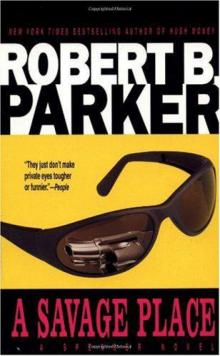 A Savage Place s-8
A Savage Place s-8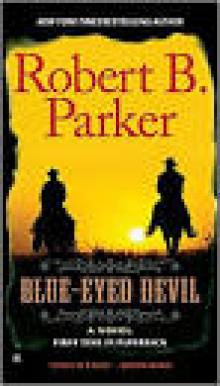 Appaloosa / Resolution / Brimstone / Blue-Eyed Devil
Appaloosa / Resolution / Brimstone / Blue-Eyed Devil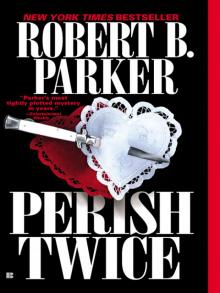 Perish Twice
Perish Twice Spare Change
Spare Change Family Honor
Family Honor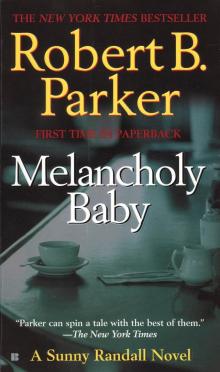 Melancholy Baby
Melancholy Baby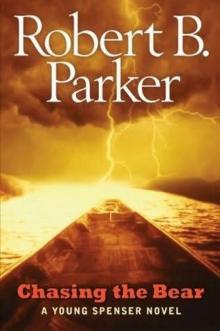 Chasing the Bear
Chasing the Bear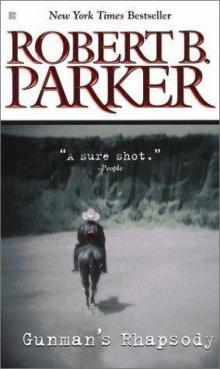 Gunman's Rhapsody
Gunman's Rhapsody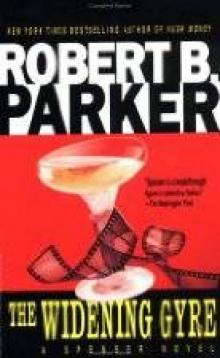 The Widening Gyre
The Widening Gyre Thin Air
Thin Air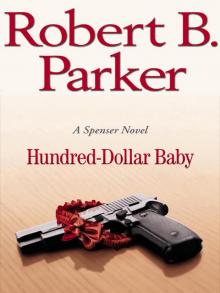 Hundred-Dollar Baby
Hundred-Dollar Baby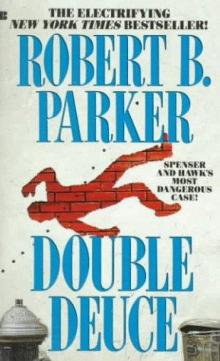 Double Deuce s-19
Double Deuce s-19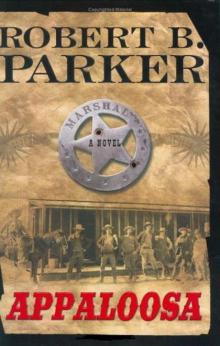 Appaloosa vcaeh-1
Appaloosa vcaeh-1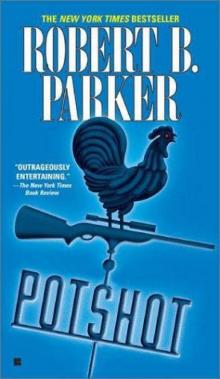 Potshot
Potshot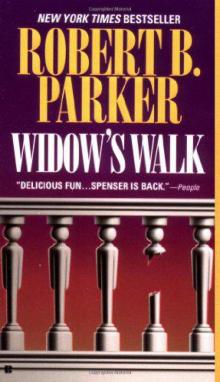 Widow’s Walk s-29
Widow’s Walk s-29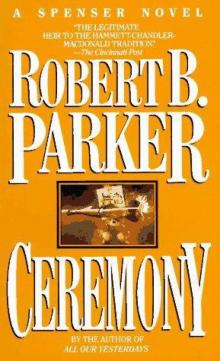 Ceremony s-9
Ceremony s-9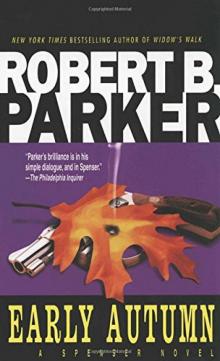 Early Autumn
Early Autumn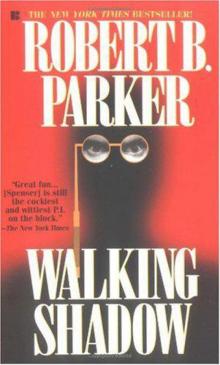 Walking Shadow s-21
Walking Shadow s-21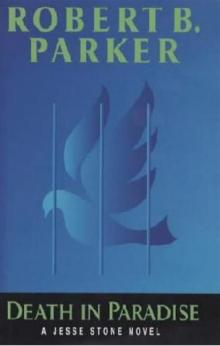 Death In Paradise js-3
Death In Paradise js-3 Shrink Rap
Shrink Rap Blue-Eyed Devil
Blue-Eyed Devil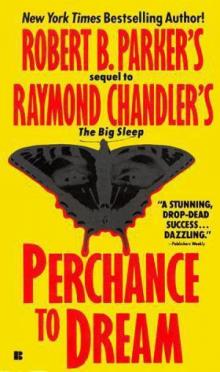 Perchance to Dream
Perchance to Dream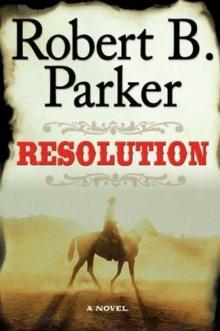 Resolution vcaeh-2
Resolution vcaeh-2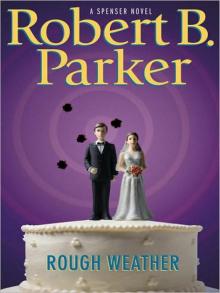 Rough Weather
Rough Weather The Jesse Stone Novels 6-9
The Jesse Stone Novels 6-9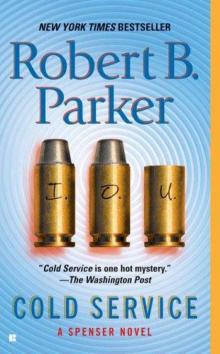 Cold Service s-32
Cold Service s-32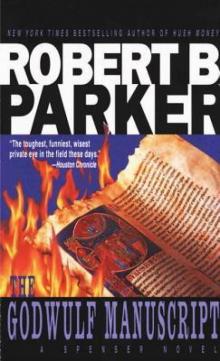 The Godwulf Manuscript
The Godwulf Manuscript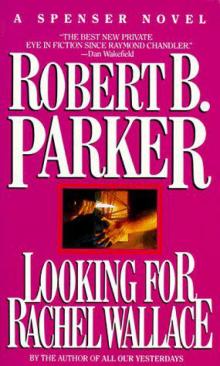 Looking for Rachel Wallace s-6
Looking for Rachel Wallace s-6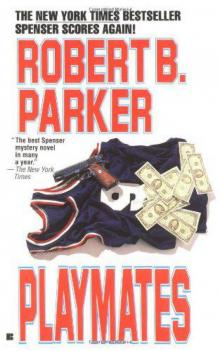 Playmates s-16
Playmates s-16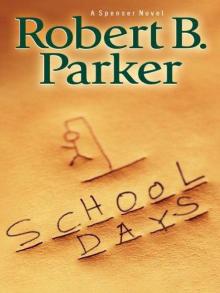 School Days s-33
School Days s-33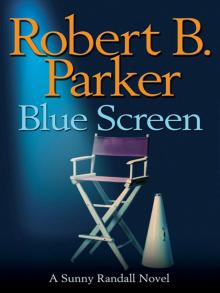 Blue Screen
Blue Screen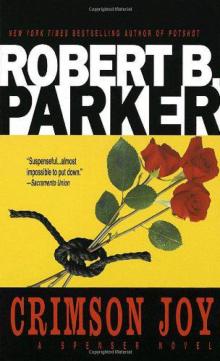 Crimson Joy
Crimson Joy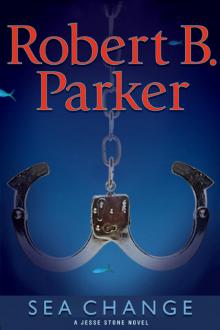 Sea Change js-5
Sea Change js-5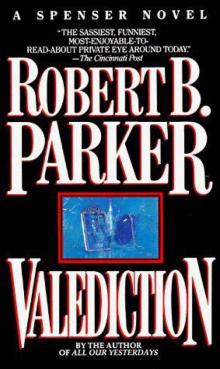 Valediction s-11
Valediction s-11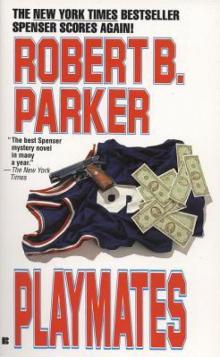 Playmates
Playmates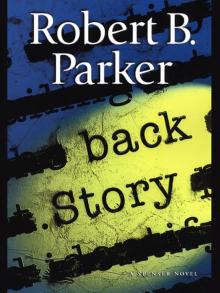 Back Story
Back Story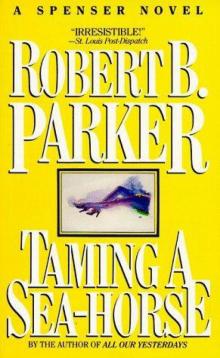 Taming a Sea Horse
Taming a Sea Horse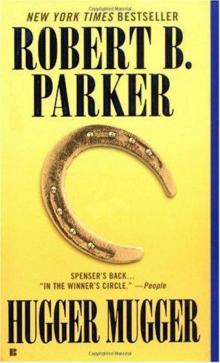 Hugger Mugger
Hugger Mugger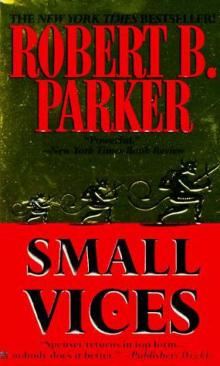 Small Vices s-24
Small Vices s-24 Silent Night: A Spenser Holiday Novel
Silent Night: A Spenser Holiday Novel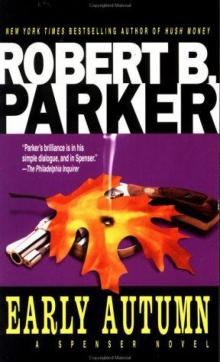 Early Autumn s-7
Early Autumn s-7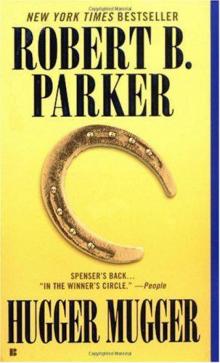 Hugger Mugger s-27
Hugger Mugger s-27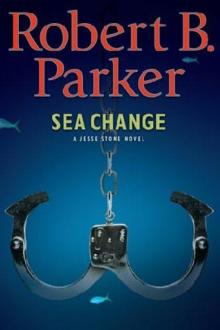 (5/10) Sea Change
(5/10) Sea Change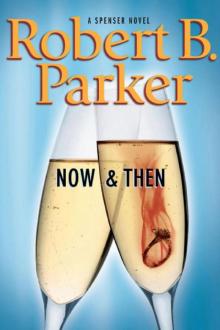 Now and Then
Now and Then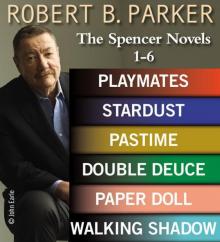 Robert B. Parker: The Spencer Novels 1?6
Robert B. Parker: The Spencer Novels 1?6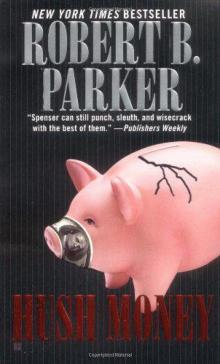 Hush Money s-26
Hush Money s-26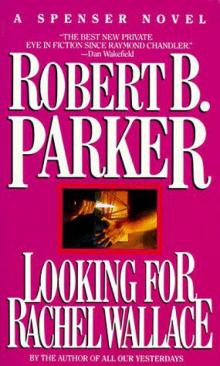 Looking for Rachel Wallace
Looking for Rachel Wallace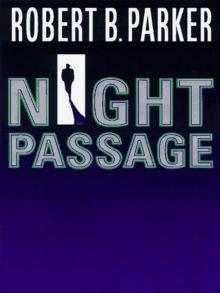 Night Passage
Night Passage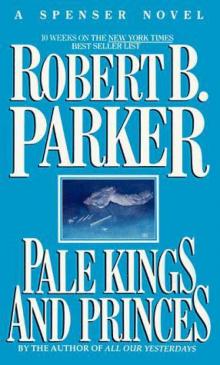 Pale Kings and Princes
Pale Kings and Princes All Our Yesterdays
All Our Yesterdays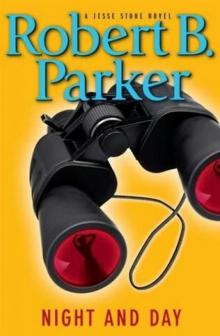 Night and Day js-8
Night and Day js-8 Stranger in Paradise js-7
Stranger in Paradise js-7 Double Play
Double Play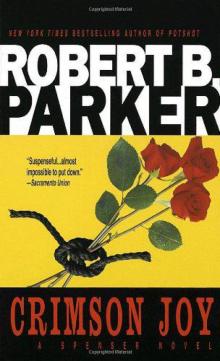 Crimson Joy s-15
Crimson Joy s-15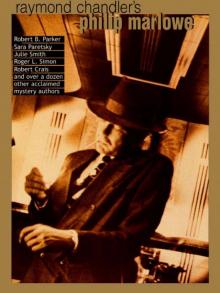 Raymond Chandler's Philip Marlowe
Raymond Chandler's Philip Marlowe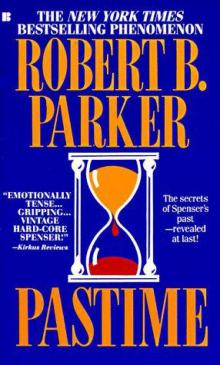 Pastime
Pastime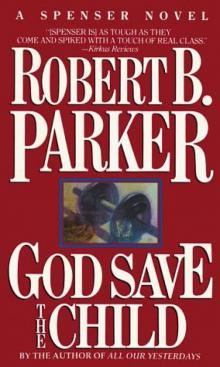 God Save the Child s-2
God Save the Child s-2 Bad Business
Bad Business Trouble in Paradise js-2
Trouble in Paradise js-2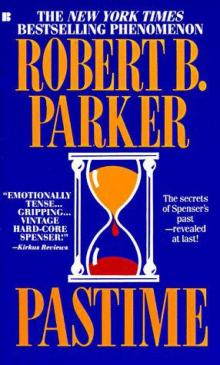 Pastime s-18
Pastime s-18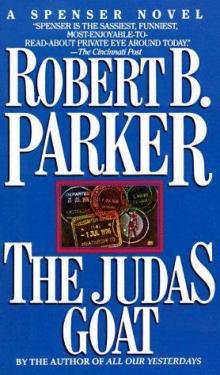 The Judas Goat s-5
The Judas Goat s-5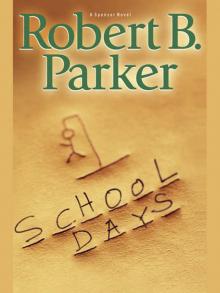 School Days
School Days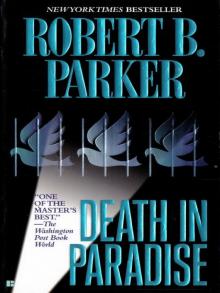 Death In Paradise
Death In Paradise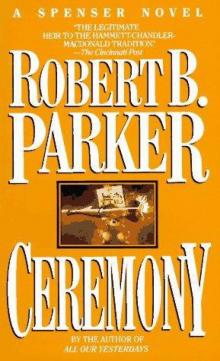 Ceremony
Ceremony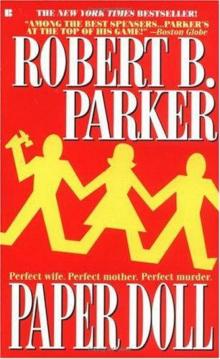 Paper Doll s-20
Paper Doll s-20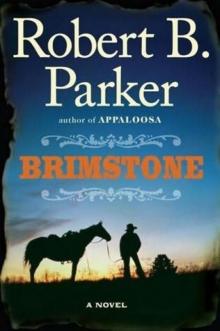 Brimstone vcaeh-3
Brimstone vcaeh-3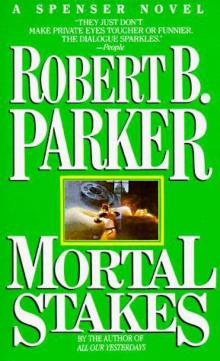 Mortal Stakes s-3
Mortal Stakes s-3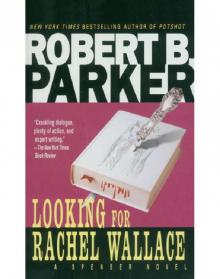 Spencer 06 - Looking for Rachel Wallace
Spencer 06 - Looking for Rachel Wallace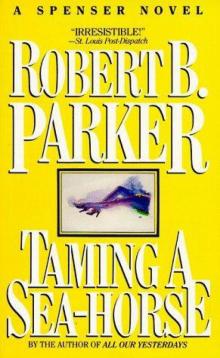 Taming a Sea Horse s-13
Taming a Sea Horse s-13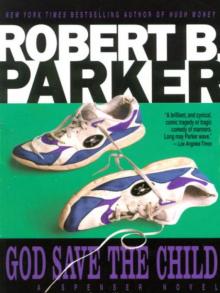 God Save the Child
God Save the Child Chance
Chance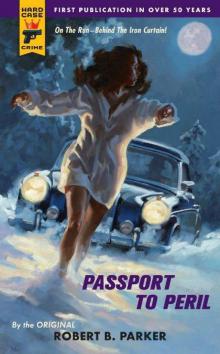 Passport To Peril hcc-57
Passport To Peril hcc-57 Promised Land
Promised Land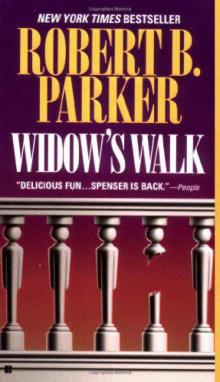 Widow’s Walk
Widow’s Walk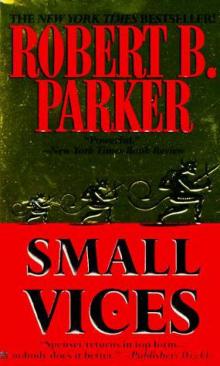 Small Vices
Small Vices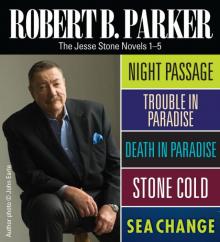 Robert B Parker: The Jesse Stone Novels 1-5
Robert B Parker: The Jesse Stone Novels 1-5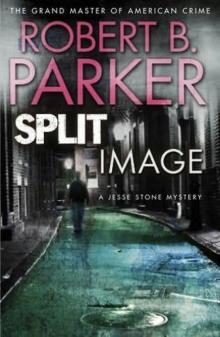 Split Image js-9
Split Image js-9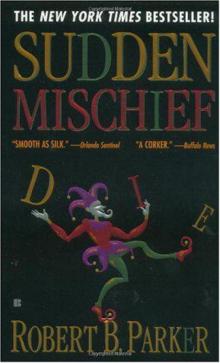 Sudden Mischief s-25
Sudden Mischief s-25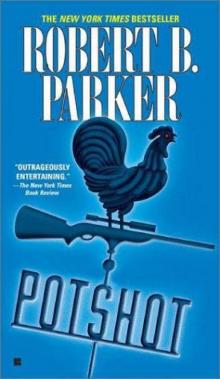 Potshot s-28
Potshot s-28 Split Image
Split Image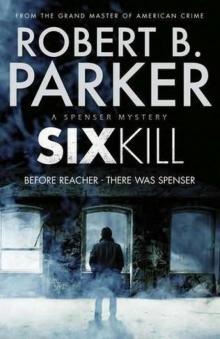 Sixkill s-40
Sixkill s-40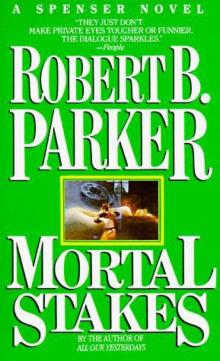 Mortal Stakes
Mortal Stakes Stardust
Stardust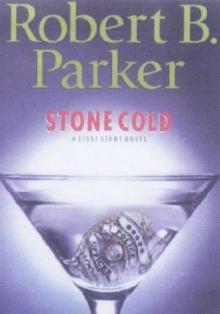 Stone Cold js-4
Stone Cold js-4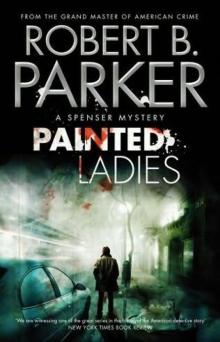 Painted Ladies s-39
Painted Ladies s-39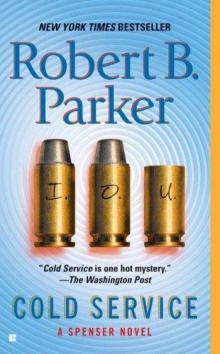 Cold Service
Cold Service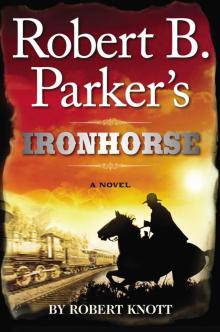 Ironhorse
Ironhorse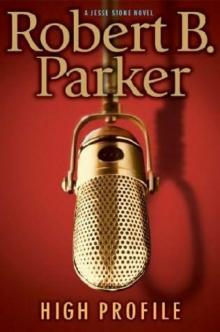 High Profile js-6
High Profile js-6 The Boxer and the Spy
The Boxer and the Spy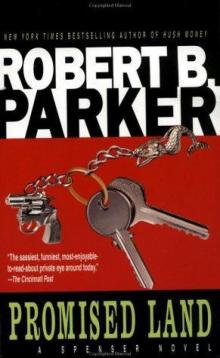 Promised Land s-4
Promised Land s-4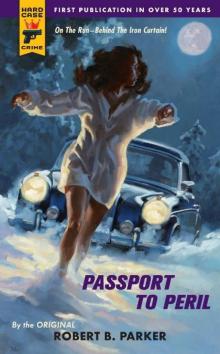 Passport to Peril (Hard Case Crime (Mass Market Paperback))
Passport to Peril (Hard Case Crime (Mass Market Paperback))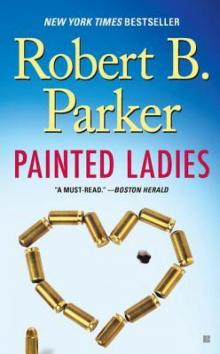 Painted Ladies
Painted Ladies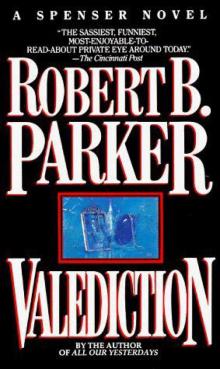 Valediction
Valediction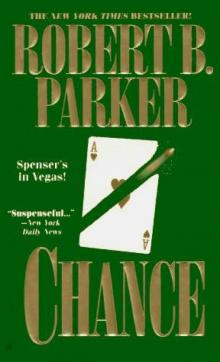 Chance s-23
Chance s-23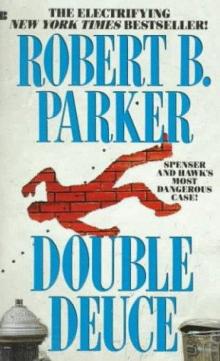 Double Deuce
Double Deuce Wilderness
Wilderness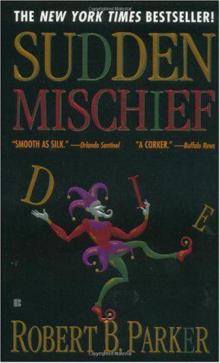 Sudden Mischief
Sudden Mischief Night Passage js-1
Night Passage js-1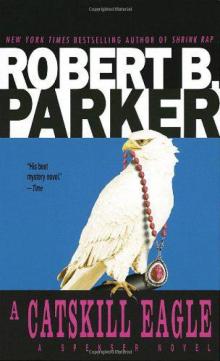 A Catskill Eagle
A Catskill Eagle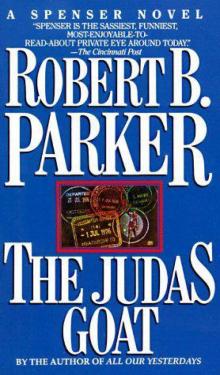 The Judas Goat
The Judas Goat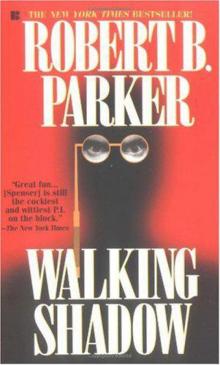 Walking Shadow
Walking Shadow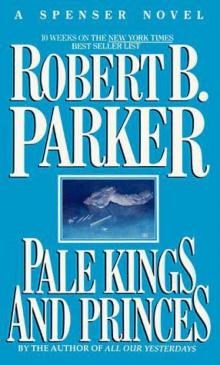 Pale Kings and Princes s-14
Pale Kings and Princes s-14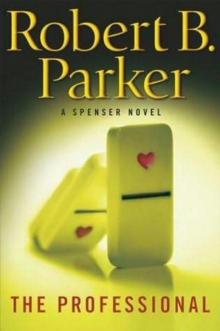 The Professional
The Professional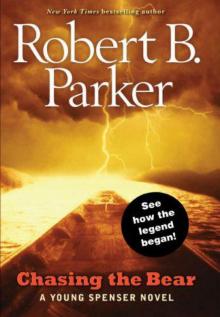 Chasing the Bear s-37
Chasing the Bear s-37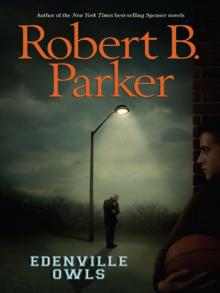 Edenville Owls
Edenville Owls Sixkill
Sixkill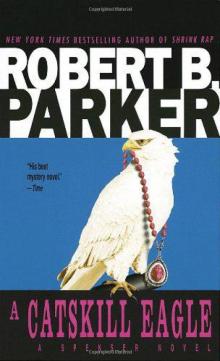 A Catskill Eagle s-12
A Catskill Eagle s-12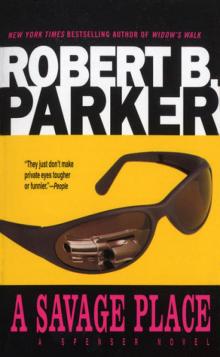 A Savage Place
A Savage Place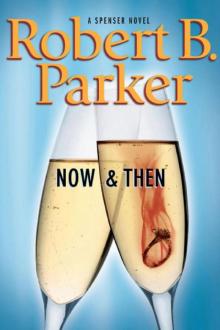 Now and Then s-35
Now and Then s-35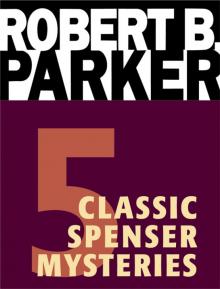 Five Classic Spenser Mysteries
Five Classic Spenser Mysteries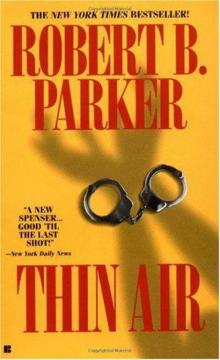 Thin Air s-22
Thin Air s-22